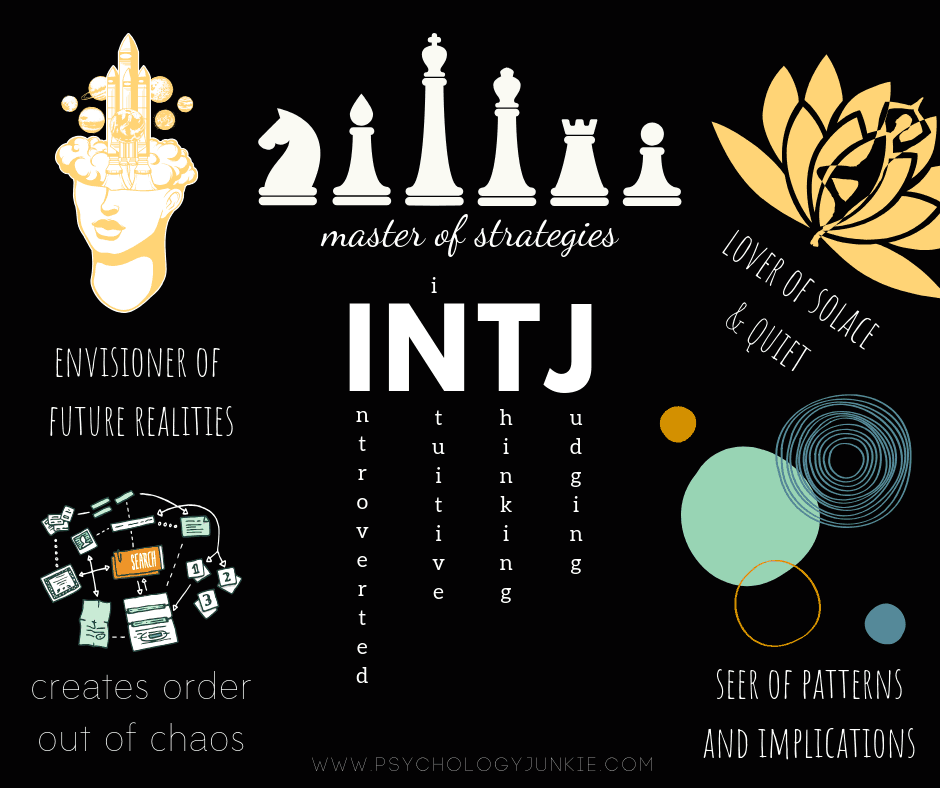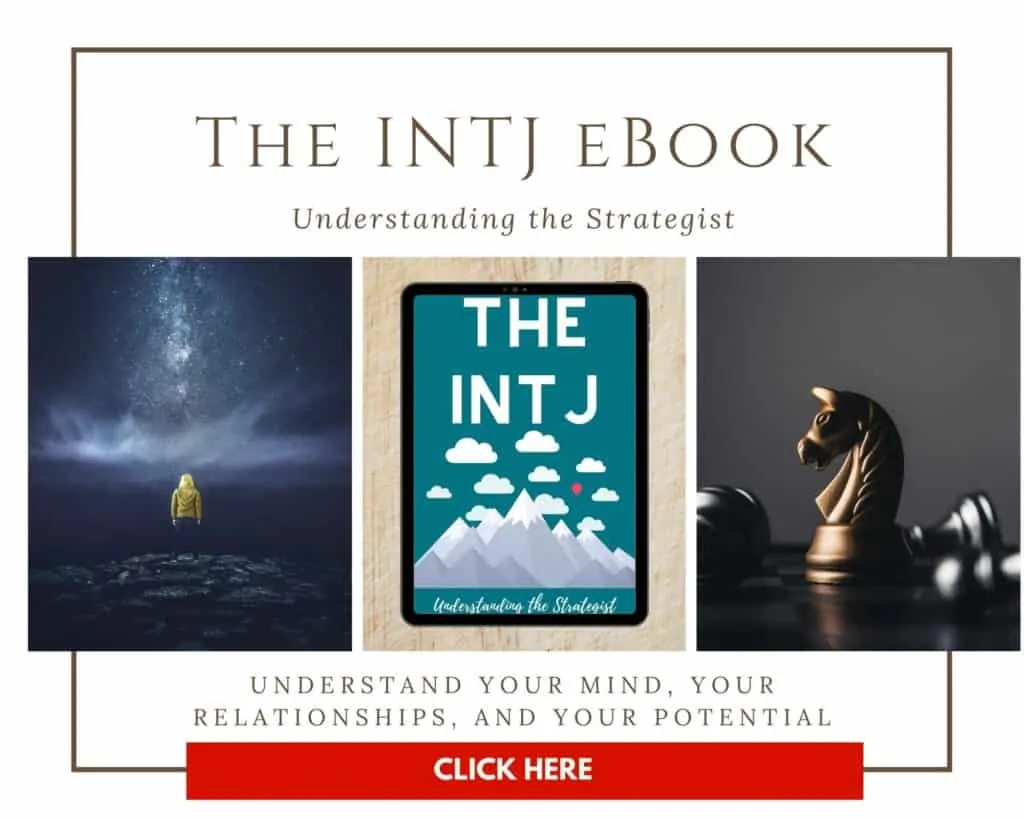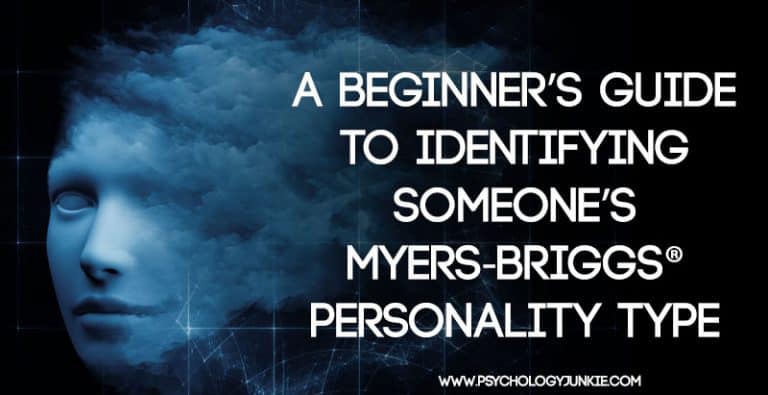What It Means to be an INTJ Personality Type
What it Means to be an INTJ – The Strategic, Insightful Type
Independent, Organized, Visionary, and Rational
The INTJ Personality Type in Brief
What does “INTJ” mean? Do you ever hear these four-letter personality type codes and feel baffled by them? Well, today we’re going to explore what it really means to be an INTJ – and what those letters are really all about!

INTJs approach life with a desire to understand the deeper meaning of all things. They see everything from a global perspective and can quickly connect new information to overall patterns. They are also quick to pick up on themes, connections, and likely outcomes, which helps them to be prepared and rarely surprised. These types have a great deal of inner drive that they use to implement their ideas and visions. Their gift for synthesizing complicated ideas into solid, tangible realities is often unmatched.
INTJ Identity
INTJs tend to be the philosophers, scientists, and inventors of the world. They seek to understand the essential nature of all things, and they view everything in the broadest, most complex level possible. They see life as having many layers of meaning and their goal is to peel back each layer to discover a deeper sense of understanding. For the INTJ, life is about understanding the “background-processes” of reality. Their intuition drives them to understand the meaning of life itself.
Another hallmark of this type is that they don’t want to just contemplate life’s meaning – they want to put their thoughts into action. They have a gift for organizing ideas, objects, and information to achieve objectives and be productive. Excellent planners and strategists, they seem to innately know how to structure their world so that tasks are completed in a timely way.
Not sure what your personality type is? Take our new personality questionnaire!
- Driving Force: To understand the “dance of the universe.” To see the underlying meaning of all things.
- Backup Strength: Understanding of how to organize and structure the outside world to achieve objectives. An eye for logical organization and analysis.
- Weaknesses: Can lose track of details by focusing so much on the abstract. May become out of touch with reality or panic when having to deal with a lot of details unexpectedly.
- Stressors: Lack of alone time, over-stimulation, navigating unfamiliar places, dealing with irrational people, multi-tasking, focusing on nitty-gritty details.
The Meaning of the Four-Letter Code (in Brief)
I = Introversion. INTJs focus inwards before outwards, analyzing what things mean to them before responding to the environment.
N = iNtuition. INTJs focus more on the abstract or potential of something than the concrete or existing reality.
T = Thinking. INTJs like to decide things by looking at the logical consequences of their choices. They mentally step away from a situation so that they can examine the pros and cons objectively.
J = Judgment. INTJs like having things settled, decided and structured. They are typically work-before-play people.
Famous Rumored INTJs: Isaac Newton, Ayn Rand, Friedrich Nietzsche, Mark Zuckerberg, Bobby Fischer, Nikola Tesla, Stephen Hawking, John Adams, Isaac Asimov, Christopher Hitchens, Martin Luther, G.W.F. Hegel, James Cameron, Jodie Foster, Annie Clark, Russell Crowe, Patrick Stewart.
INTJ Overview
One of the most defining qualities of the INTJ personality type is how much they trust their intuitive insights. They are wired to grasp the details of what’s going on beneath the surface and have a talent for seeing and connecting what others might view as unexplainable information. Patterns and connections are their focus – they want to see how everything in life is connected in a global way. According to neuroscience expert Dario Nardi, INTJs experience a mental state of flow when they are tasked to solve a complex problem or envision a future scenario. As INTJ Nikola Tesla said, “The present is theirs; the future, for which I have really worked, is mine.” Tesla captures what many INTJs feel – that the future is what matters. What’s happening now is only important insomuch as it influences what will happen someday. This can be a good thing in that INTJs have uncannily accurate predictions about how things will play out in the future. It can also be a problem because it can lead the INTJ into a state of perpetual dissatisfaction with the present moment.
INTJs focus on strategizing, envisioning, and understanding. They have a gift for defining goals, creating detailed plans (and contingency plans), and predicting possible outcomes. Their long-range focus helps them to predict out much further than many people realize. Often, they feel like they just know something, but they don’t always know how they know it. They find true joy in understanding all the nuts and bolts behind their visions so that they can explain them and take some action because of them. It is extremely frustrating for them when they try to explain their predictions and people won’t listen to them. Many times they find themselves shaking their heads as, weeks, months, or years later, their prediction plays out and people wonder why they weren’t prepared.
The Determination of the INTJ
Although INTJs are introverts, they will devote a great deal of time and energy towards making things happen in the outside world. They just need to wait until they have an understanding of the implications, nuances, and scope of a project before beginning. Once they have a clear vision they are nearly unstoppable in their efforts. Their drive is focused, powerful, and singular – they feel a compulsion to reach their objectives without getting distracted or tired. This can eventually lead to burnout if they aren’t careful. When INTJs are working towards a goal they have no problem delegating, leading, and organizing everything (and everyone) in their environment to make their objective a reality. If the people around them seem incompetent then they will try to take the whole project on themselves.
Because INTJs are so skilled at creating and implementing innovative solutions and systems, they are often prized in the workforce. They tend to enjoy working independently, or as part of a small team. Having control over their actions and schedule is important to them. They’ve generally mapped out the most precise, strategic steps to achieve something and don’t want to have to deal with a lot of needless rules or distractions that the wrong leadership can cause. Ideally, INTJs want to work in a structured, organized environment with colleagues who are competent, logical, and productive. They tend to dislike careers that force them to work on a lot of nitty-gritty, detailed tasks or repetitive processes.
Careers INTJs Tend to Do Well In:
Engineer, scientist, programmer, accountant, lawyer, designer, writer, artist, economist, physician, mathematician, executive, editor.
At Their Best:
At their best, INTJs have visionary insight, wisdom, open-mindedness, and strategic capability. They are able to synthesize complex issues and they seem to understand the deeper meanings and perspectives behind what’s going on around them. Open-minded and kind, they appreciate people with different preferences and see the value of Sensing/Feeling/Perceiving preferences rather than believing their mentality is the “best” one. They are accepting of others and, while they still like to be productive, they also know how to relax and enjoy the simple pleasures in life. It’s important to these INTJs to learn from a variety of people and to be slow to judge. At this level, they are usually more in touch with the physical world than they are at average or unhealthy levels.
At this level, INTJs often seem revolutionary in their thinking. They are observant and curious, seeing relationships in things that seem unrelated to most people. They are aware of their weaknesses as well as their strengths and rely on their long-range thinking to make wise decisions and mentor people around them.
Average INTJs:
At an average level, INTJs seem creative, insightful, organized, and analytical. They have a knack for seeing patterns and connections, and will often plan far in advance for their future and all the goals they want to achieve. When dealing with others, they are fairly private, but also fair, logical, and unafraid to challenge views that seem incorrect or irrational to them. They may give lots of “feedback” to people about how they could do things better and may forget to show praise or appreciation.
At this level, they will realize they have some weaknesses and blind spots. These typically show up in a lack of attention to detail or a lack of sensitivity to other people’s feelings or values. They will start to see how Sensing and Feeling preferences have their value and may seek SF types for input on decisions that aren’t solved by Intuition and Thinking.
Average INTJs are typically effective in the workplace, although they crave a great deal of independence and may tire of jobs that require a lot of management or interpersonal communication. They can also appear critical, impatient, and overly-blunt when dealing with others.
Unhealthy INTJs:
At an unhealthy level, INTJs might overuse their Intuition and experience it in an inflated, unrealistic way. They appear single-minded, intolerant, impractical, and “checked out” of their surroundings. Often they will rely on their thinking process to justify their ideas and organize them. However, their lack of attention to detail will cause their plans to be less effective than they could be. They often fall into the trap of “forcing” logic to comply with their ideas, visions, or arguments.
In conflict situations, unhealthy INTJs tend to state their opinion decidedly and then withdraw or imply that the other side is just irrational without fully hearing them out. They are often seen by others as condescending, reclusive, pessimistic, and dismissive. It is often hard for them to connect with people because they are so quick to find fault with others and have no problem criticizing other people’s level of intelligence before hearing them out and getting all the relevant facts and details. They can also be task-focused to the point of workaholism, or in contrast, they may be so caught up in their ideas and visions that they fail to be productive at all.
Some INTJs spend the majority of their lives at an average or healthy state, while others fluctuate between the three states depending on their stress levels, environment, and/or maturity. Every individual’s experience will vary.
Personal Growth Recommendations for INTJs:
- Take time for solitude and peace. Meditate, pray, or let your mind wander without forcing it into a particular direction. Write down any epiphanies, symbols, or ideas that come to you.
- As you’re listening to someone speak, focus on their intentions and perspective. What are they trying to achieve? What are they feeling emotionally? What’s their motive? This develops your intuition and empathy.
- When you make a statement about something, identify what’s true and what is an assumption. Are you trying to “bend” logic to fit with your idea? Are there any facts or details you’re missing?
- Make a list of values that are important to you. Think about the values of the people around you. How can you respect your values in your life choices? How can you respect theirs?
- If you believe someone is in need of help or emotional support, text them, email them, or sit by them and ask “Is everything okay?”
- Don’t forget to tap into the present moment. Several times throughout the day make a concerted effort to stay totally present. Listen actively to the person talking to you. Feel your inner sensations. Are there any experiences you could enjoy? Do you need any food, water, or rest? How can you make the most of this moment and fully enjoy it?
What Are Your Thoughts?
Does this article resonate with you as an INTJ? Do you have any experiences or insights to share? Let us know in the comments!
Find out more about your personality type in our eBooks, The INTJ – Understanding the Strategist, Discovering You: Unlocking the Power of Personality Type, The INFJ – Understanding the Mystic, and The INFP – Understanding the Dreamer. You can also connect with me via Facebook, Instagram, or Twitter!
Find Out More About Your Type:
The Shadow of the INTJ Personality Type
5 Reasons Why You’ll Need an INTJ During a Zombie Apocalypse
10 Things That Excite the INTJ Personality Type
7 Reasons Why You Need an INTJ Friend in Your Life











Dear Ms Storm, I thoroughly enjoyed your article “What It Means to be an INTJ Personality Type” and have known my personality type since the early 90’s. Although I took a course and quite a lengthy questionnaire to determine the INTJ in me, one thing I can say about self analysis is that it can be dangerous to one’s self by thinking, and settling on, the notion that I might just be flawed. Coupled with a “background” of desiring to please others, you can see the potential for confusion on my part. It has actually been within the last few years that I have grasped fully who I am and still am learning new things each day; “eureka moments” so to speak. I am not into social media for means of contact and information, but will subscribe to receive items via email. Thanks again.
Wow! I very much enjoyed reading this accurate post. I love reading more about my personality type, figuring out more about myself, and relating to things I may or may not know about the INTJ.
This was entirely spot on for me personally. All the suggestions you mention for improvement are all things I remind myself of on a daily basis. Maybe someday I’ll overcome the INTJ weaknesses! I feel so understood – thank you for posting this!
Thank you .Thank you. Thank you.
Reading about intimidating people was like looking in the mirror, warts and all.
I must admit, sometimes it’s fun when I realize my honesty puts some folks in their place. But, I am trying not to scare the ones I love!
Best descriptions ever I read so far about INTJ. It covers all aspects with a clear and logical sense. I really thank you so much for giving such wonderful insights.
Thank you!! I’m so glad that you enjoyed this description!!
Ok your test confirms, again… And yet, I am modifying the answers, so I suppose it is quite accurate. It’s not an hard science, so I guess it makes sense that I find myself in the INTP, ISTP, ISTJ, or ISFP…
Carcal , i have tested on more platform and always coming same INTJ . Im what i am .
I really like the hard and real testing of my ideas. As much as possible.
Thank you for the explanation but I sometimes base my decisions (especially when it relates to people) on emotions. I am quick to grasp which they want from me, rationale or empathy. I respond accordingly as that’s what would help both or all of us.
You however didn’t make us all INTJs insensitive and arrogant, for we do work on ourselves too.. I appreciate that you know and shared that.
Finally, I have come to terms with myself. After being convinced that I was an INFJ for quite a while and even testing like one. I knew something was off, though. In the end I have discovered my true type and that is the most important thing, even if that meant being confused and disillusioned about my type for a while. This site has been very helpful during my journey of self discovery. Thanks!
Love love LOVE this analysis and description! I can identify with points made! I definitely need to be more in tune with my emotional side and those of others.
I’m not sure about this test. One answer refers to logic, the other emotion. What if one uses them interchangeably depending on the situation? I may try to sense someone’s feeling before responding, but I use logic to correctly explain my answer. I’m confused as I use both emotions and logic interchangeably. You can just be one or the other. It depends on the situation. I find logic in things but sometimes logic has no place. And then you need to gauge things based on emotions.
Thank you for the explanation but I sometimes base my decisions (especially when it relates to people) on emotions. I am quick to grasp which they want from me, rationale or empathy. I respond accordingly as that’s what would help both or all of us.
You however didn’t make us all INTJs insensitive and arrogant, for we do work on ourselves too.. I appreciate that you know and shared that.
I can relate to being an unhealthy INTJ because I hate my job. How can I become an average INTJ? Get another job? It’s not easy these days.
Hi Peter. Job has an important influence, but it is not about it. Ask yourself what is your real will, your real desires, goals and ideals that you would find peace living and working towards to. It is the dissonance between ideal and ‘doing this/wasting myself’ in this job that creates dissatisfaction, mood swings, not so good performance. If you can see your job as part of realizing your goals, or at least as a stepping stone, if you can make sense of your actual work and life in light of your vision; you can reach peace of mind which would improve severely your attitude and habits. If your actual path really doesn’t add to long term you will be plainly conscious and be forced to decide and work towards changing labor/environment or committing to a life in which even though you keep in that job you can make many other advances or activities so job has meaning even if only facilitating the money/stability for partial development of other deeper interests. Recognizing your true heart, assessing the reality of your situation, and deciding to change it or accomodate partly to it is in sum the solution
do INTJs struggle in identifying emotions